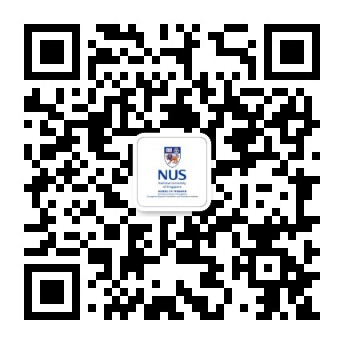On July 10, the Sustainable Aviation Forum was successfully held at the NUS Guangzhou Research Translation and Innovation Institute (NUS GRTII). The forum brought together leading figures from the Chinese and Australian aviation industries, prominent scholars, and innovative practitioners. Centered on key topics such as the low-carbon transition of civil aviation, the application of sustainable aviation fuels, and low-altitude technology innovation in the Greater Bay Area, the event jointly envisioned a blueprint for the integrated development of green aviation and smart low-altitude airspace.
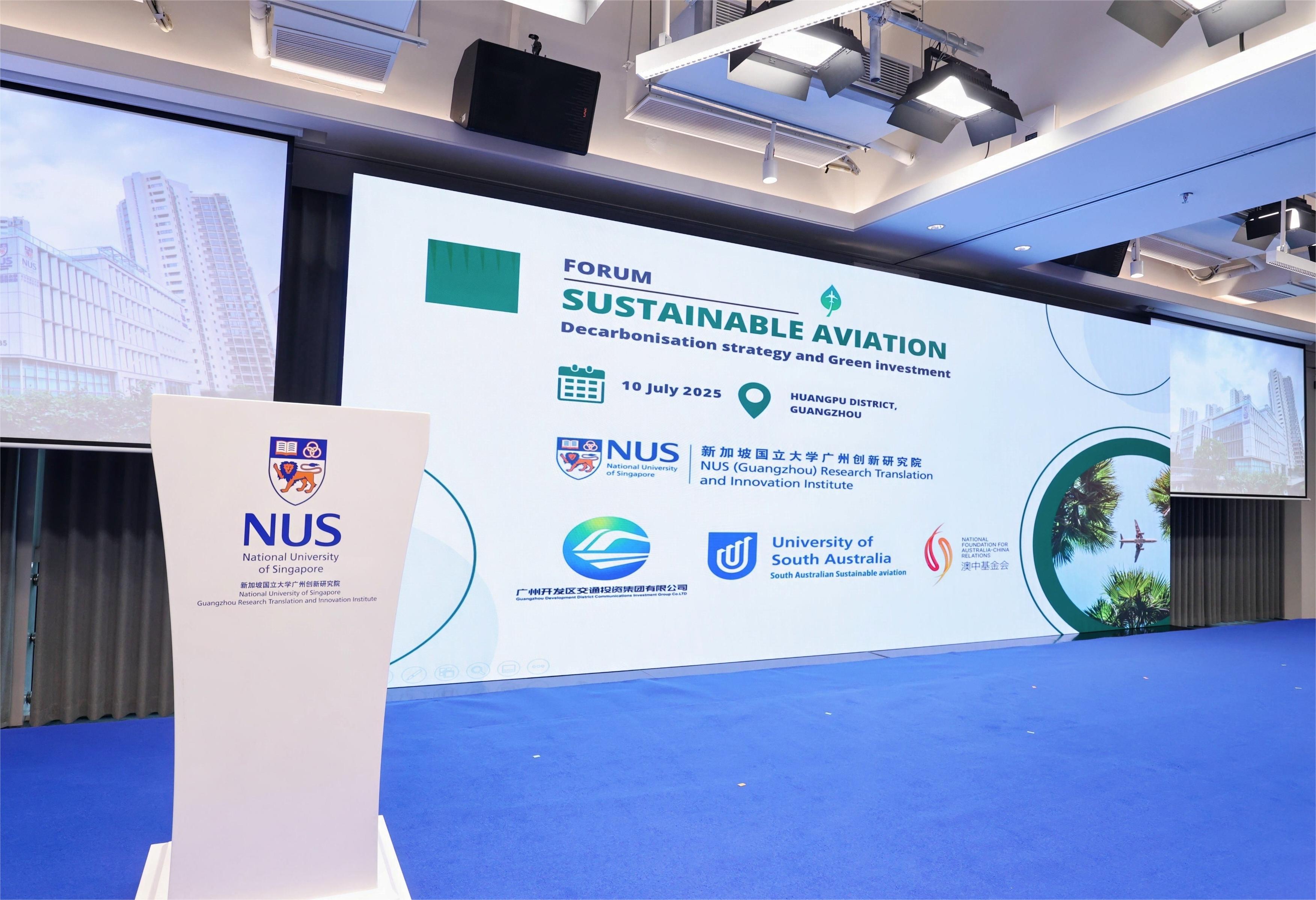
Opening Remarks
At the outset of the event, Fu Xiaofang, Senior Associate Director of NUS GRTII, delivered the opening address. On behalf of NUS GRTII, she extended a warm welcome to all the distinguished leaders and guests in attendance. She also noted that 2025 marks a critical milestone for achieving China’s dual-carbon goals, and this forum, focusing on the dual-carbon goals and the low-carbon transition of the civil aviation industry, aims to pool global expertise and explore sustainable development solutions. Drawing on the National University of Singapore’s strong research capabilities and strategic advantages, NUS GRTII has established an Intelligent Transportation and Low-Altitude Systems Laboratory, dedicated to advancing research and innovation in intelligent traffic management and low-altitude flight systems. The laboratory has been seeking to provide technological support for the aviation industry’s low-carbon transition and to promote the transformation of global scientific achievements and industrial upgrading in the Guangdong–Hong Kong–Macao Greater Bay Area.

▲Fu Xiaofang, Senior Associate Director of NUS GRTII
Next, Professor Zhang Yahua from the School of Aviation at the University of South Australia delivered his remarks. He began by sincerely thanking the organizers and co-organizers of the forum for their support for the “Sustainable Aviation” series of events, as well as acknowledging the sponsorship of the National Foundation for Australia-China Relations. He emphasized that the forum aims to promote exchanges and cooperation between China and Australia in the field of sustainable aviation and to jointly advance the low-carbon transformation of the civil aviation industry. He expressed his hope that the industry guests would engage in in-depth discussions, exchange ideas, and foster stronger connections.
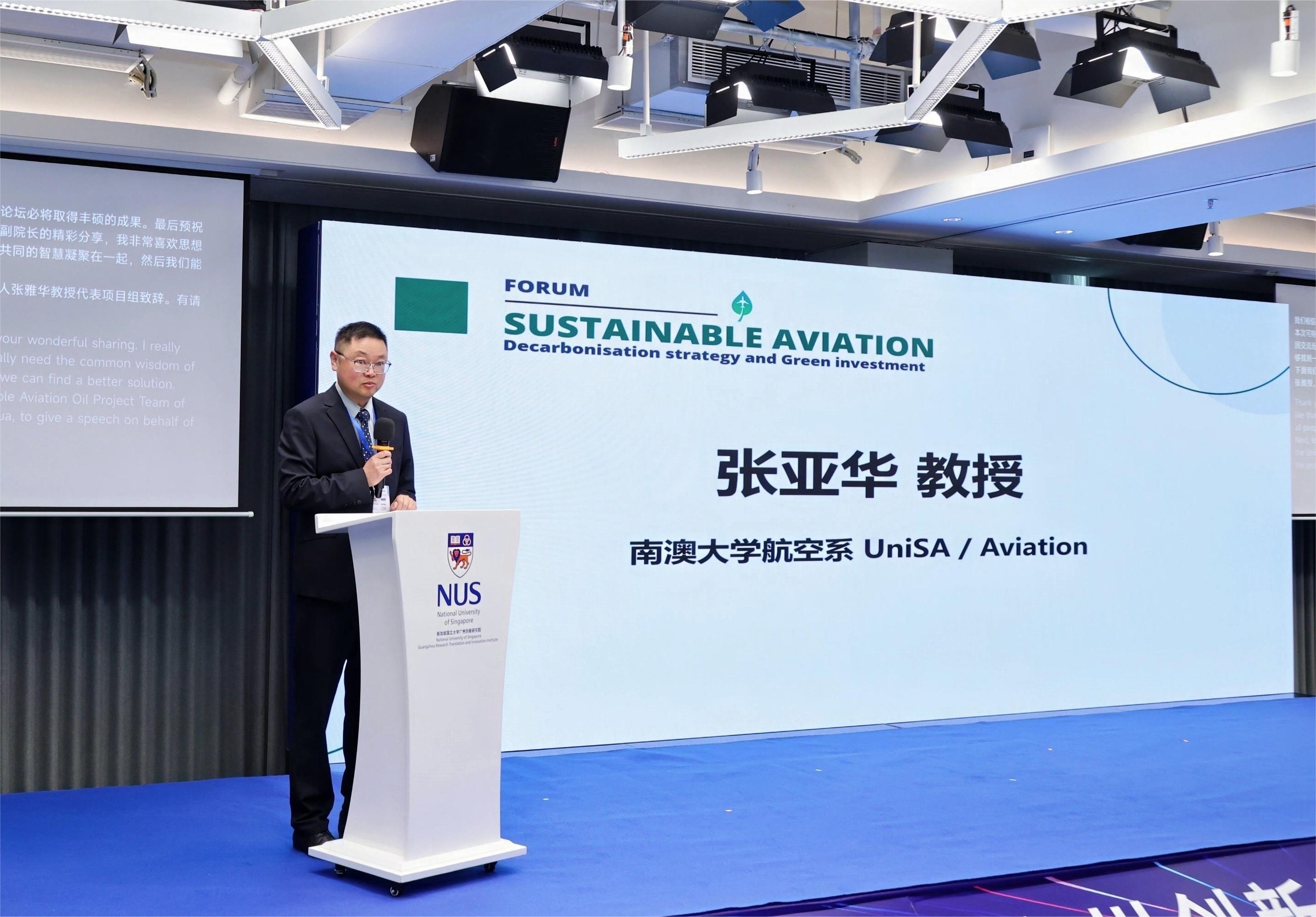
▲Professor Zhang Yahua from the School of Aviation at the University of South Australia
With the theme “Dual-Carbon Goals and the Low-Carbon Transition of the Civil Aviation Industry,” the forum featured keynote speakers who explored the development directions, technological advances, and market challenges of sustainable aviation from multiple perspectives, including the low-carbon transition of civil aviation, sustainable aviation fuels, and the technological applications of the low-altitude economy.
Low-Carbon Challenges in Aviation:
Reducing Costs and Improving Efficiency to Drive Sustainable Transformation
Xing Ziheng, Director of Climate Action at Cathay Pacific, outlined the decarbonization pathway of the aviation industry from the perspective of an airline. He noted that Cathay Pacific, as the first airline in China to voluntarily report its carbon emissions, has always regarded sustainability as a core strategy. He expressed his hope that the Guangdong–Hong Kong–Macao Greater Bay Area, leveraging its world-class airport cluster, robust industrial base, and strong research capabilities, could grow into a demonstration zone for low-carbon industries and advance the adoption of sustainable aviation fuels.
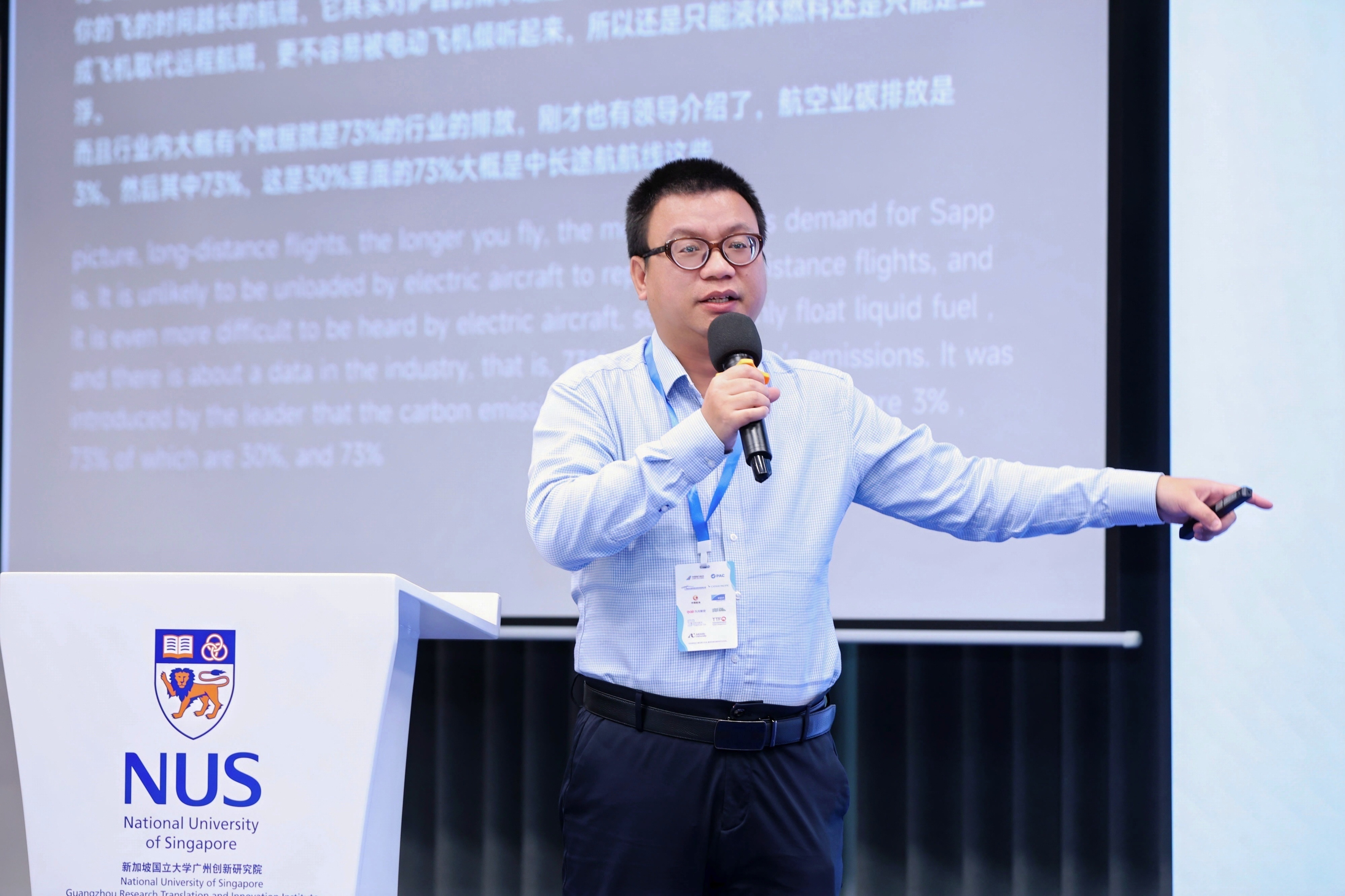
▲Xing Ziheng, Director of Climate Action at Cathay Pacific
Zhou Qiang, General Manager of the Finance Department at 9 Air, shared the challenges and practices of its low-carbon transition. As a low-cost carrier based in Guangzhou, 9 Air features high passenger load factors and high aircraft utilization rates. The airline has implemented multi-dimensional fuel management measures to reduce carbon emissions. Zhou highlighted that the core challenge for sustainable aviation lies in cost, and airlines must increasingly rely on technological cost reductions and operational optimization to advance their sustainable transformation.
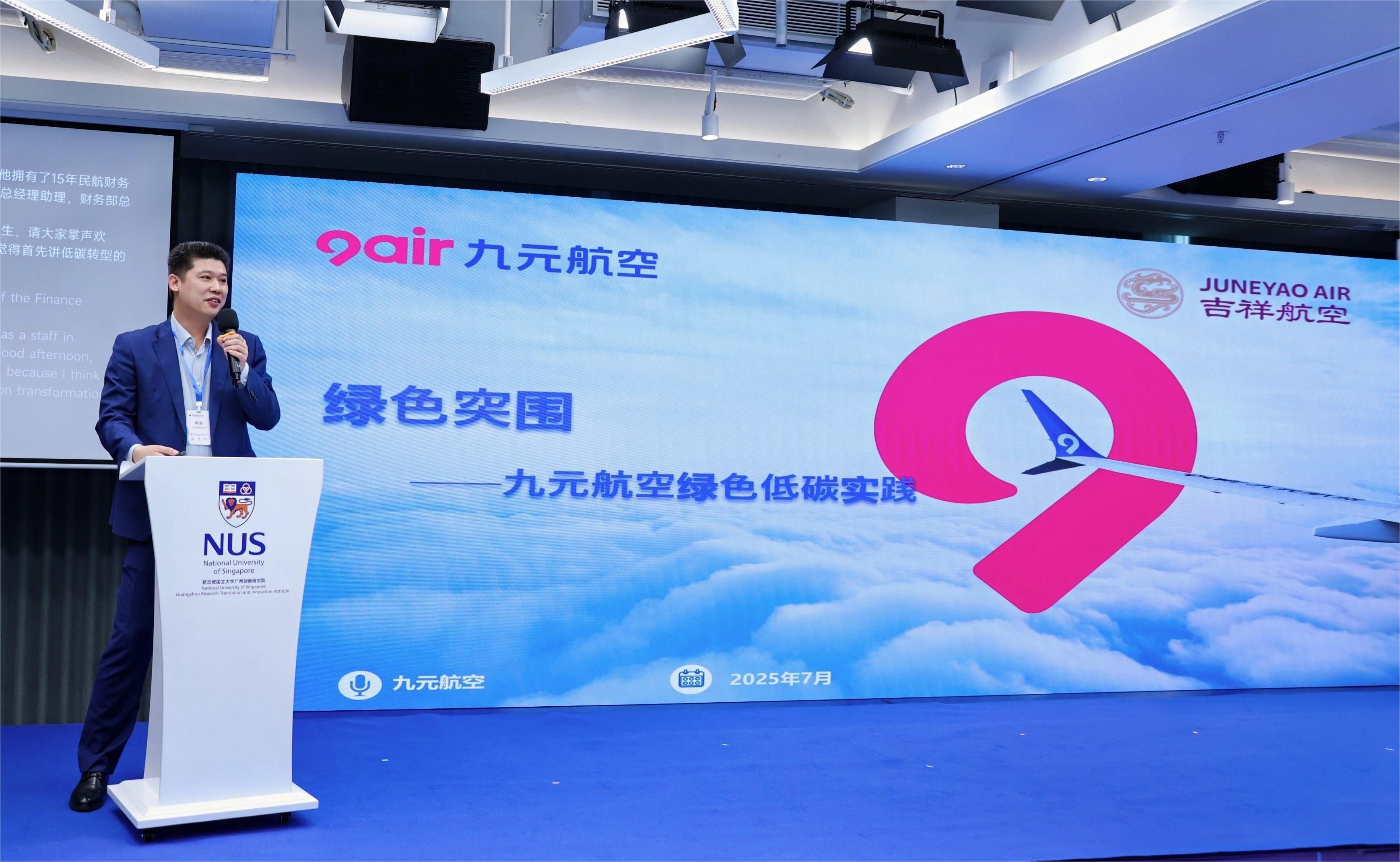
▲Zhou Qiang, General Manager of the Finance Department at 9 Air
Wang Zhengyong, Global Vice President of PAC (Precision Analyser Company), delivered a keynote speech titled “Global Trends in Sustainable Aviation Fuel Development under the CORSIA Framework.” He discussed topics such as competition for used cooking oil (UCO) feedstocks, opportunities with other compliant feedstocks, carbon pricing mechanisms in the aviation sector, and the current policy landscape in the Asia-Pacific region. He stated that PAC will leverage its years of experience in the aviation sector to support technological breakthroughs in the industry.

▲Wang Zhengyong, Global Vice President of PAC (Precision Analyser Company)
Focusing on the green transition of low-cost carriers (LCCs), Celia Lao, Senior Vice President at NexusDMC, shared insights on the global aviation emissions reduction landscape, industry targets, and four key pathways for LCCs’ green transition. Lao emphasized that decarbonizing low-cost carriers requires strong policy support from governments and close collaboration across the entire industry.
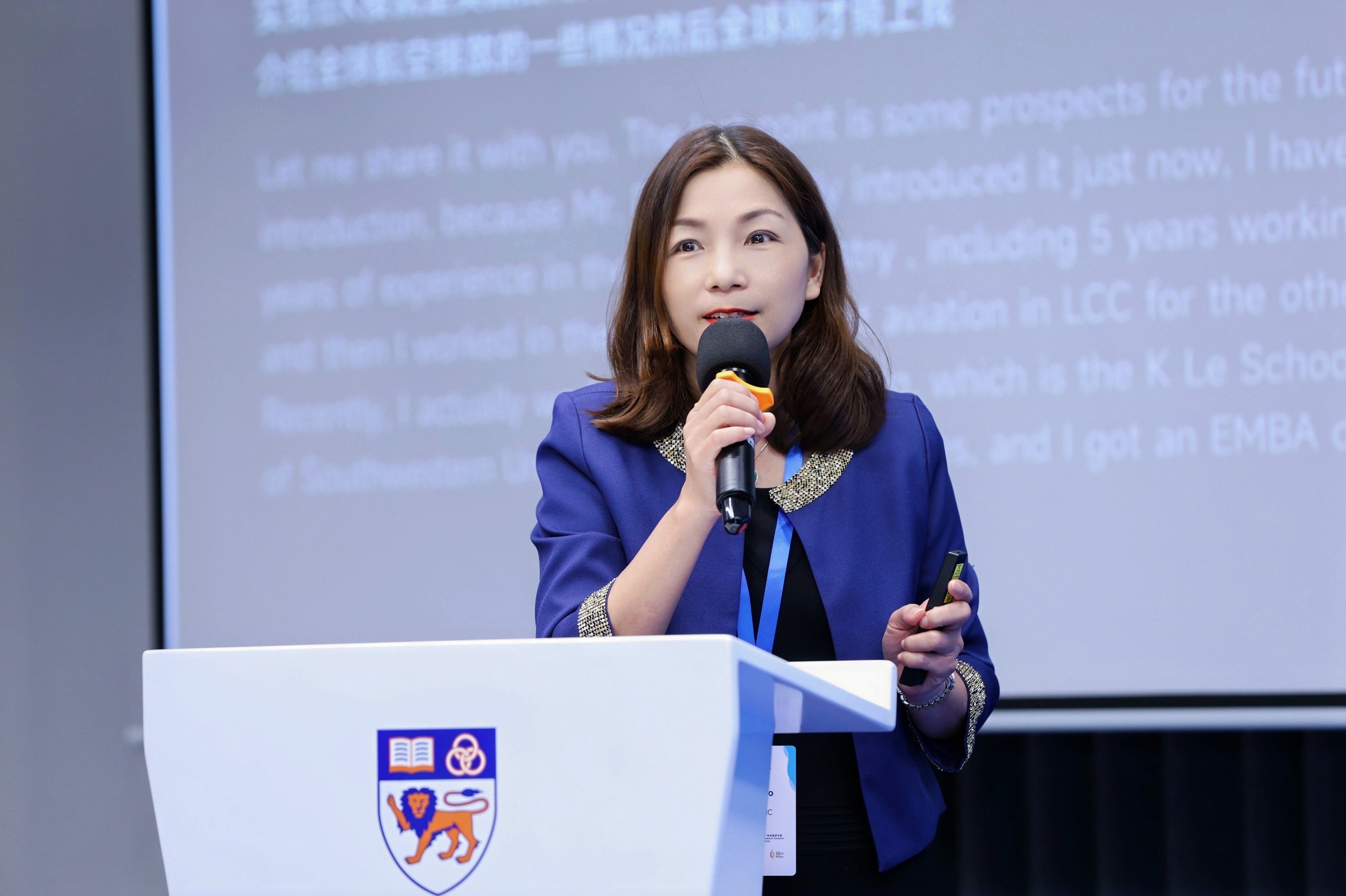
▲Celia Lao, Senior Vice President at NexusDMC
Low-Altitude Technology Applications:
Green Innovation and Collaborative Development
"Green low-altitude + zero-carbon civil aviation" represents the future direction of the aviation industry, and this forum also focused on low-altitude technology applications and the development of the low-altitude economy. Wu Weiwen, Deputy General Manager of Guangzhou Low-Altitude Industry Development Co., Ltd., presented innovations and practices in the low-altitude economy within Guangzhou Development District and Huangpu District. He analyzed current trends in the development of the low-altitude economy from multiple perspectives, noting that its core lies in low-altitude flight activities, encompassing the entire value chain of manufacturing, operations, support, and services. With a wide-reaching industrial chain, the low-altitude economy can help break down urban–rural transportation barriers, focus on airspace below 1,000 meters, and develop in synergy with the broader aviation sector.
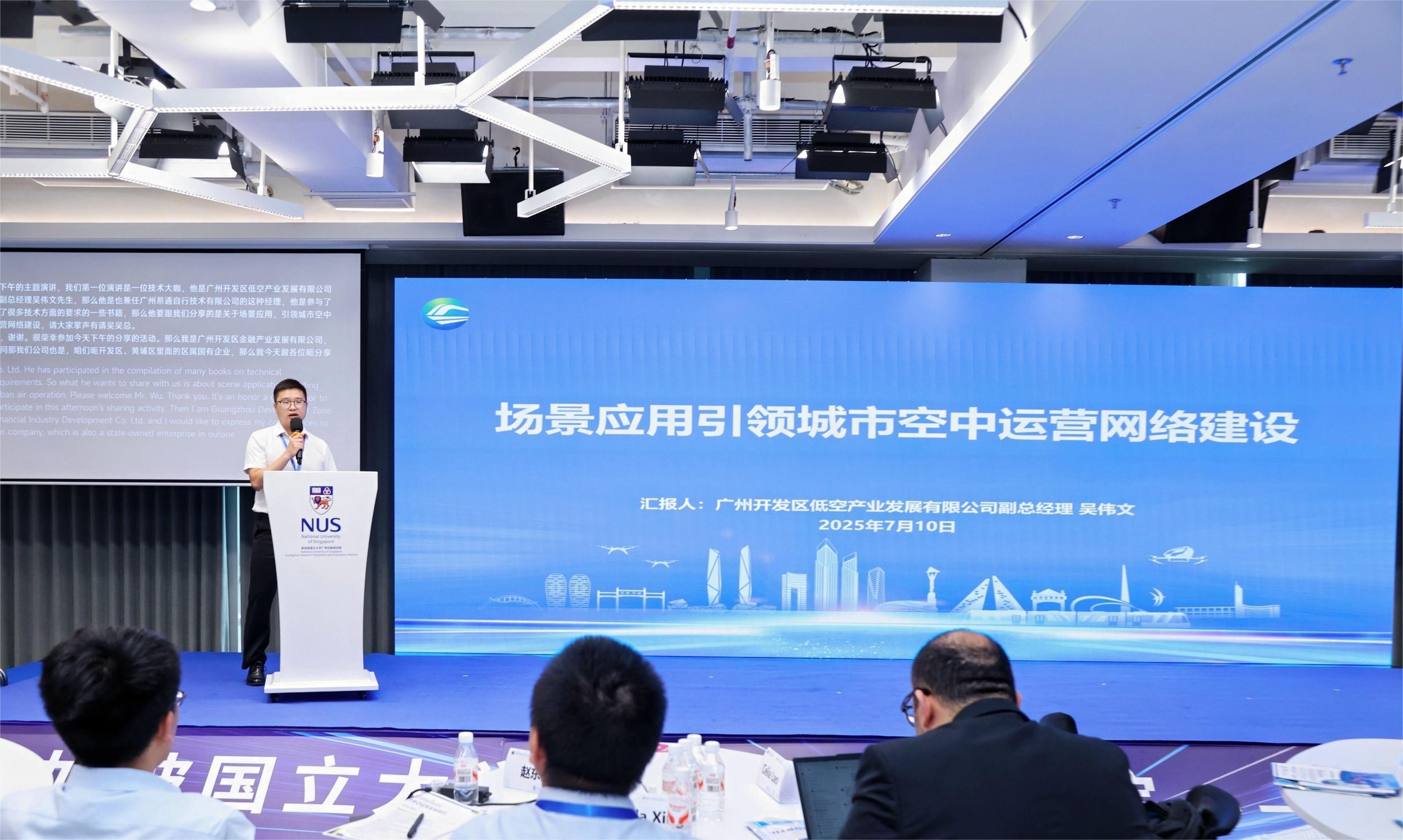
▲Wu Weiwen, Deputy General Manager of Guangzhou Low-Altitude Industry Development Co., Ltd.
Zhao Dongjie, General Manager of the Overseas Division at Qingdao Shitian Innovation Aviation Technology Co., Ltd., highlighted the application of agricultural drones within the low-altitude economy, sharing experiences of empowering green agriculture through sustainable aviation technologies. He noted that the agricultural sector, with its simpler airspace approval process and lower entry barriers, is an accessible segment of the low-altitude economy. Low-altitude technologies, he emphasized, play a significant role in advancing agricultural modernization and promoting green, sustainable development.
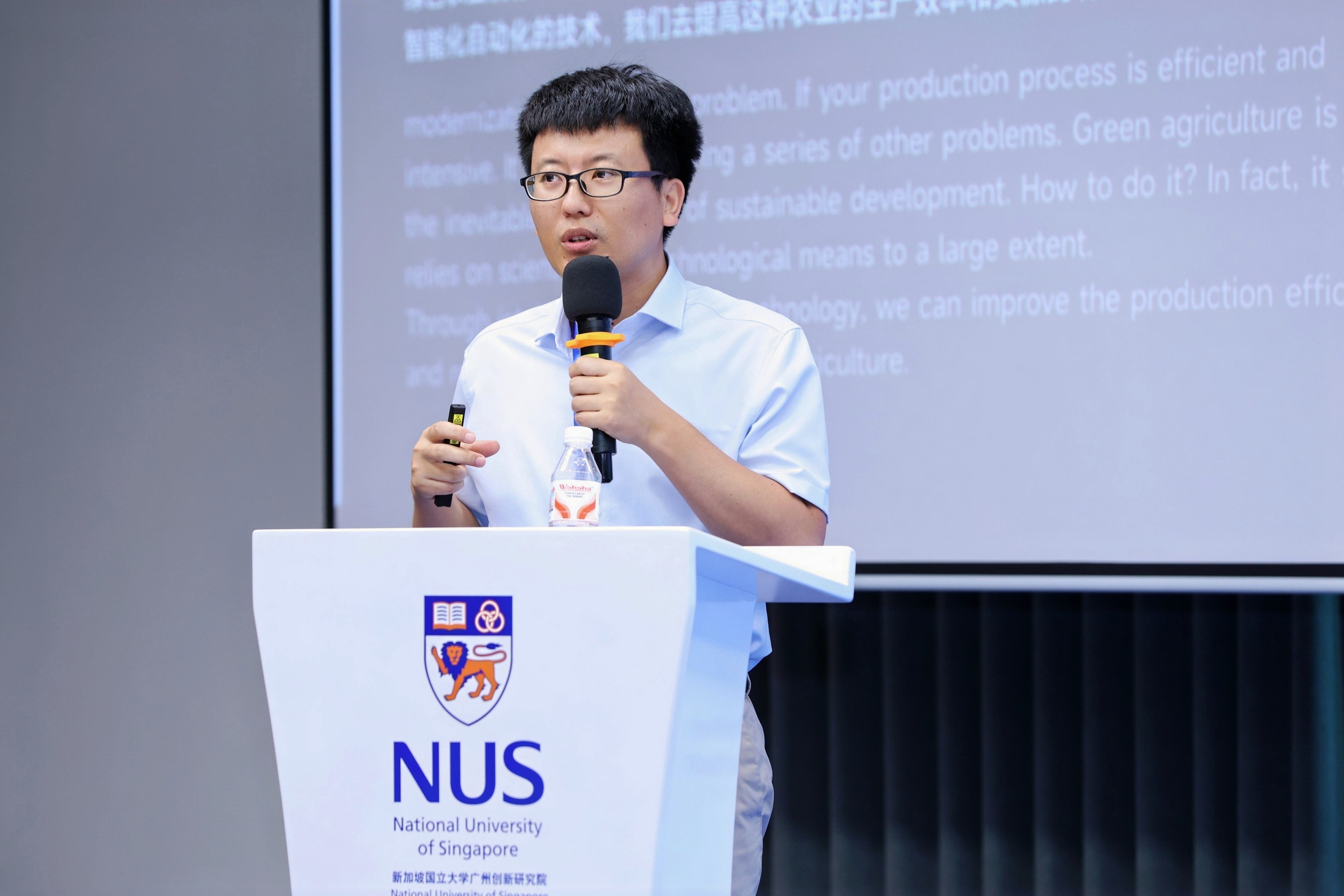
▲Zhao Dongjie, General Manager of the Overseas Division at Qingdao Shitian Innovation Aviation Technology Co., Ltd.
Ms Li Chunxin, Head of Research Translation Office at NUS GRTII, delivered a talk titled “From Lab to the World: Innovation and Application of Low-Altitude Economy Technologies.” She shared NUS GRTII’s research achievements and initiatives in this field, noting that the low-altitude economy is an important direction for the efficient development of transportation. NUS GRTII has established a low-altitude cross-domain unmanned systems experimental platform focused on overcoming challenges such as complex environment perception and GPS-denied operations, promoting the industrialization of research outcomes, and plans to engage in flight training and other industry practices to support the development of the low-altitude economy.
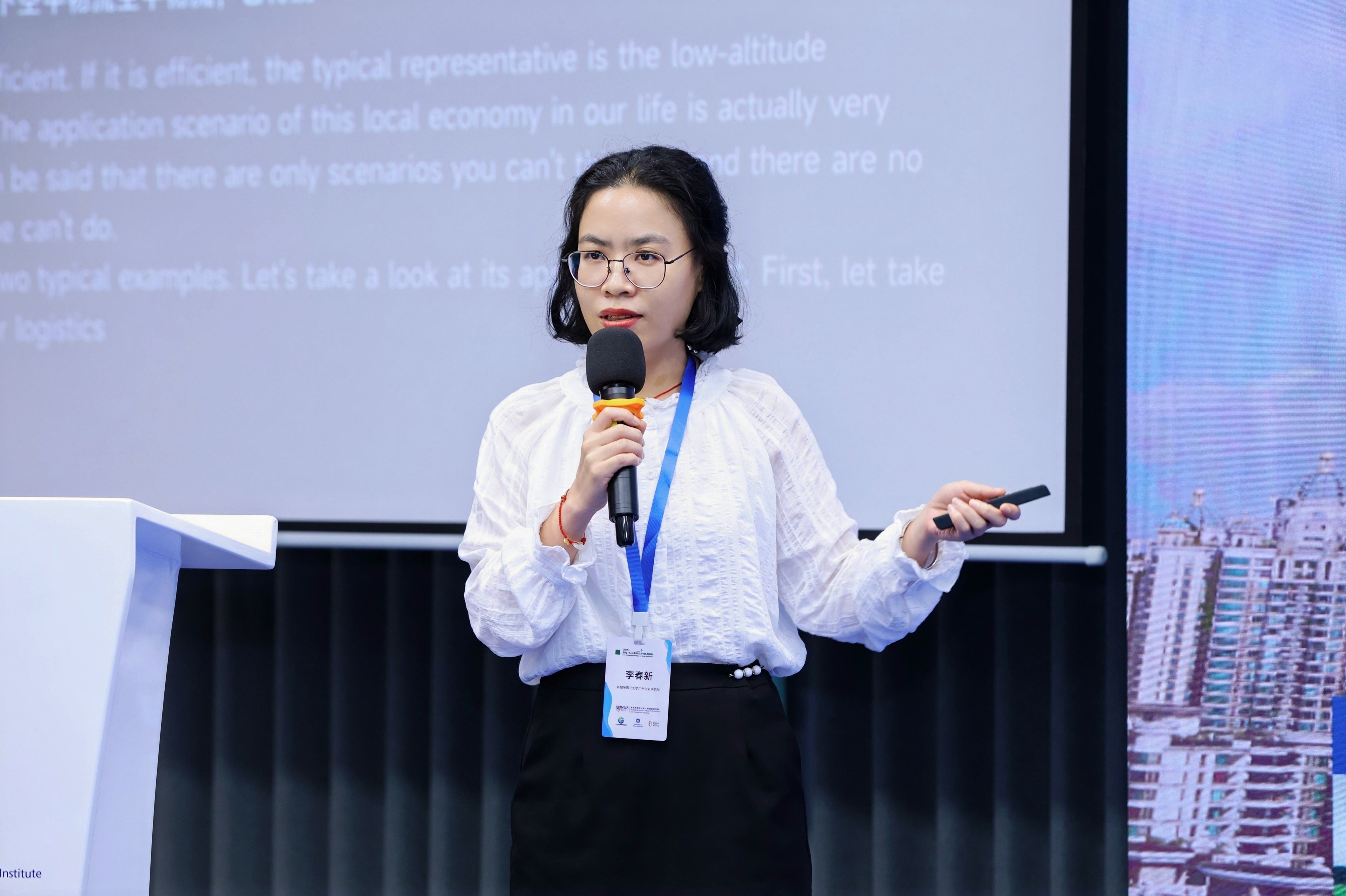
▲Li Chunxin, Head of Research Translation Office at NUS GRTII
Sustainable Aviation Fuels:
Expert Insights and Emerging Trends
Two guest speakers joined remotely from Australia to share the country’s experiences in low-carbon transition and the promotion of sustainable aviation fuels (SAF). Margy Osmond, CEO of the Tourism & Transport Forum Australia, noted that both China and Australia possess abundant SAF feedstock resources. With the recovery of tourism and the growth of Chinese visitor numbers, several Chinese airlines have launched additional China–Australia routes, further accelerating Australia’s deployment of SAF.
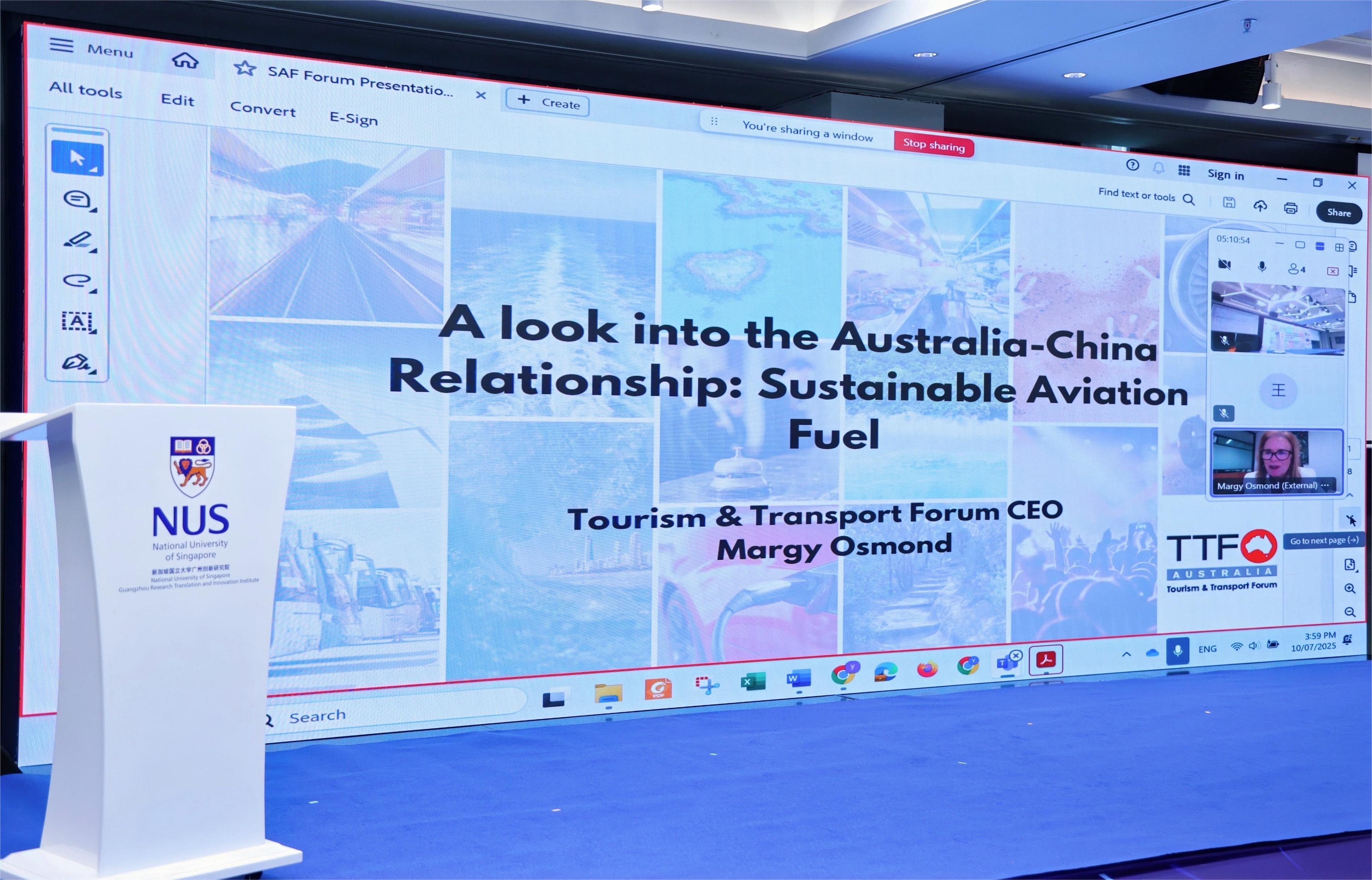
▲Margy Osmond, CEO of the Tourism & Transport Forum Australia
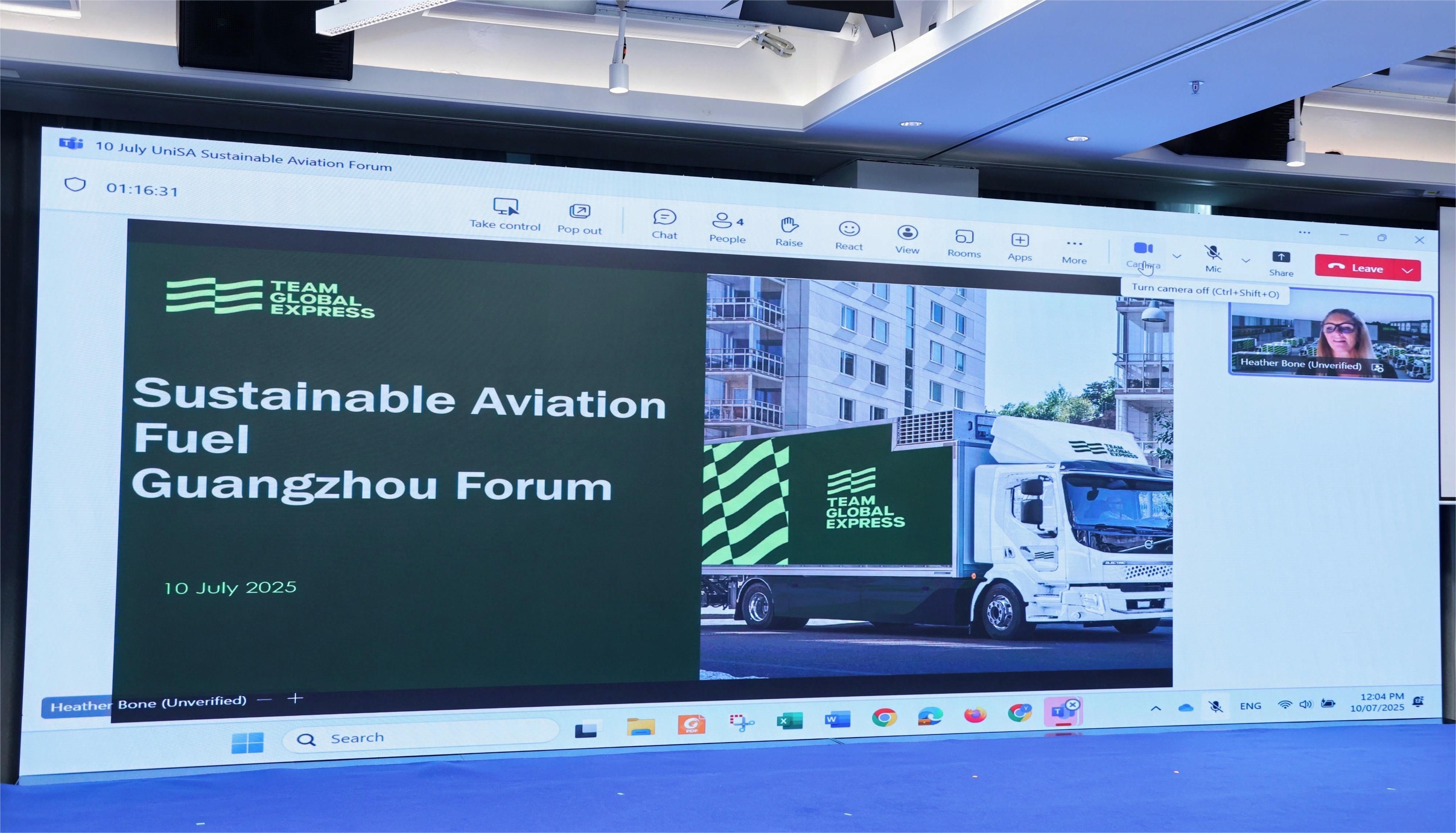
▲Heather Bone, ESG Director at Team Global Express
Heather Bone, ESG Director at Team Global Express — Australia’s largest air cargo operator — presented the company’s experience, challenges, and lessons learned in freight services and aviation emissions reduction. She expressed hope that the industry would overcome obstacles to enable the widespread adoption of SAF.
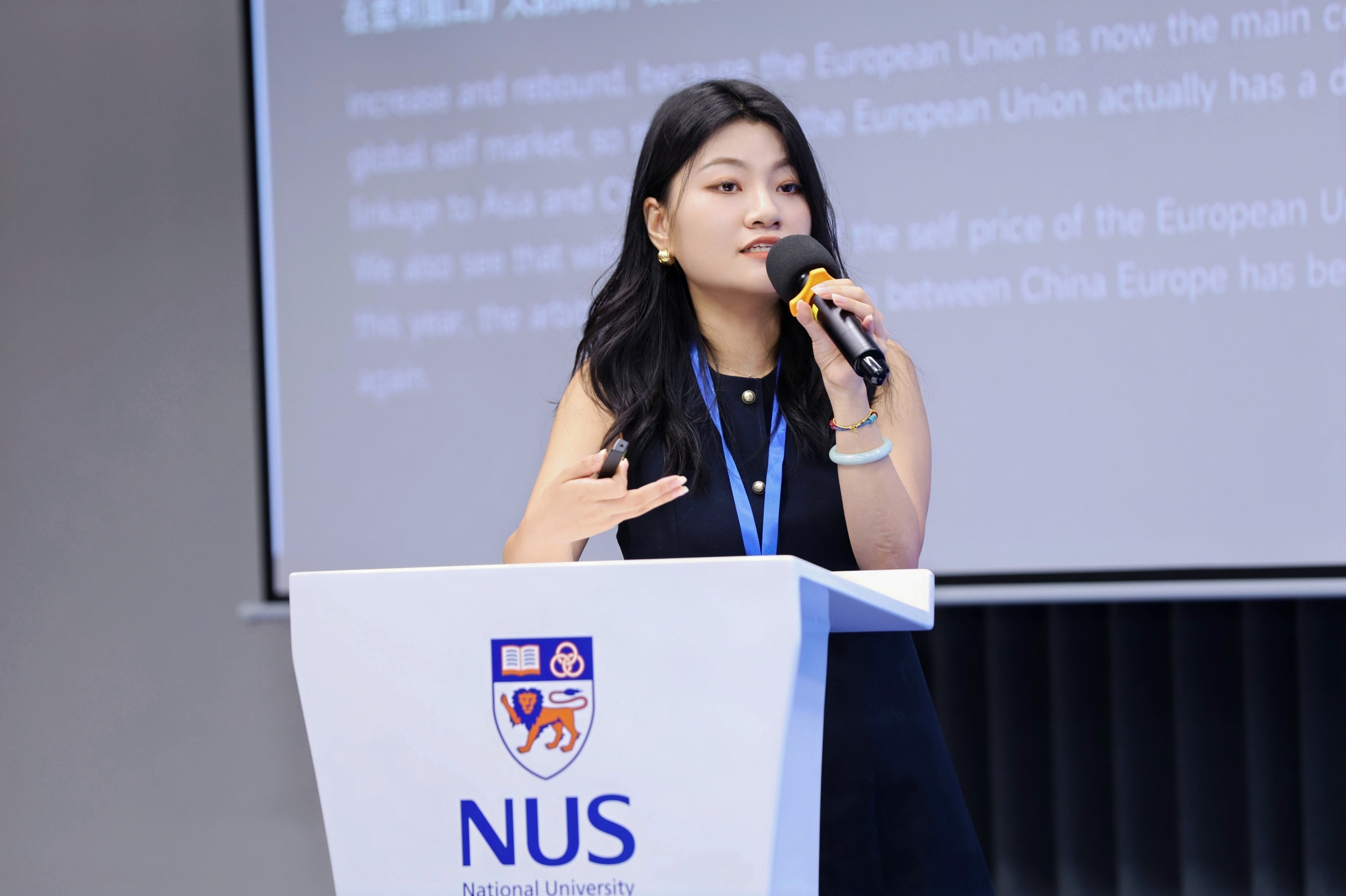
▲Liu Lingxian, Senior Analyst for Biofuels and Carbon Markets at Argus Media
Liu Lingxian, Senior Analyst for Biofuels and Carbon Markets at Argus Media, delivered a talk titled “Analysis of the Asia-Pacific Sustainable Aviation Fuel Market.” She provided a professional perspective on market targets, producers and capacities, market data, policy developments, and futures products. As an independent international energy price reporting agency, Argus has launched SAF price assessments in China, and in December 2024, the Intercontinental Exchange introduced the world’s first SAF futures contract settled on Argus prices.
Sustainability consultant Nathan Ilic shared his insights on organizational sustainability, emphasizing that sustainability requires building ecosystems and tailoring solutions to local contexts.
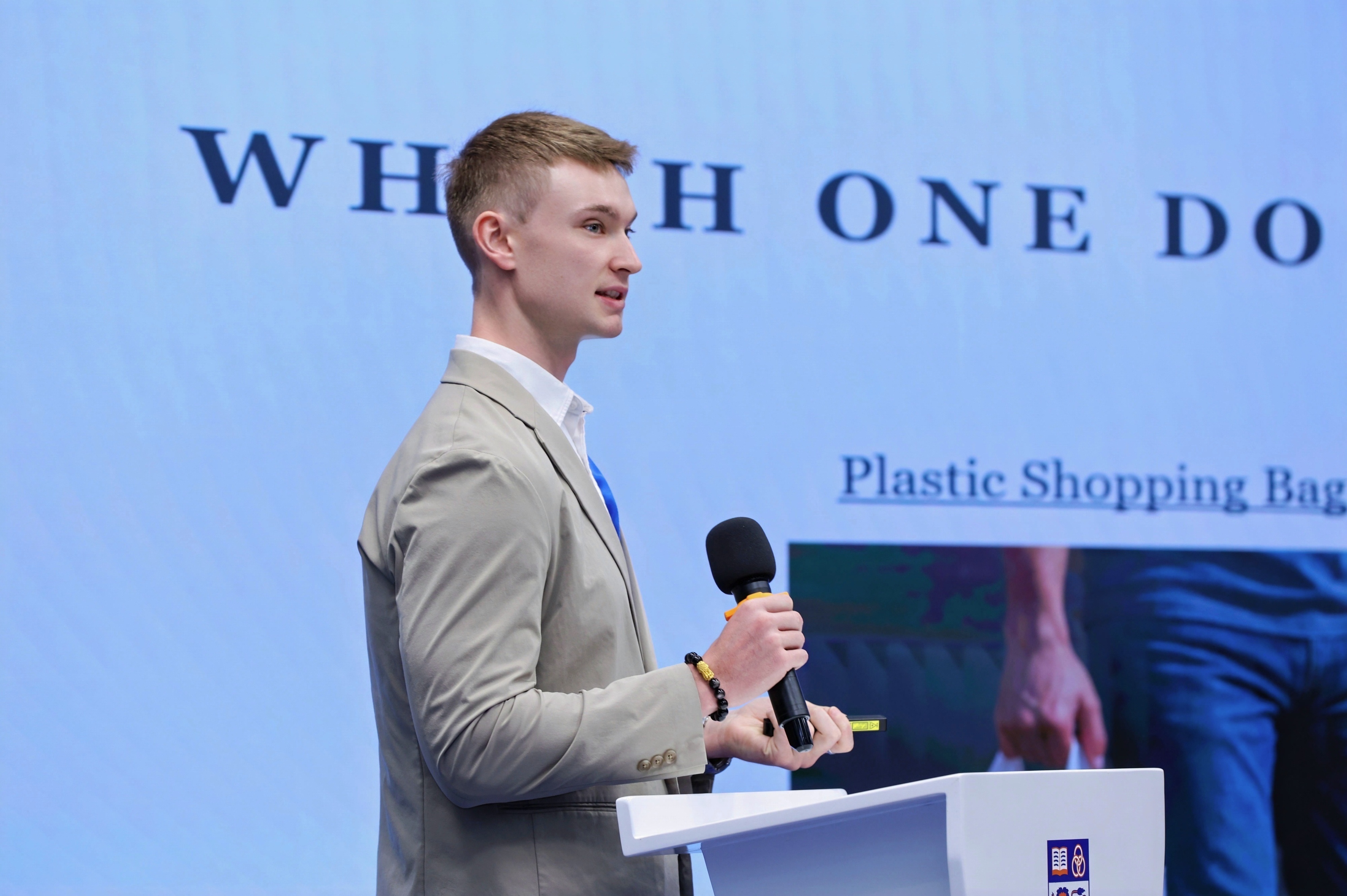
▲Sustainability consultant Nathan Ilic
Panel Discussion:
The Role of SAF in Aviation’s Low-Carbon Transition
The panel discussion session was moderated by Dr. Deng Xin, Senior Lecturer in Economics at the University of South Australia Business School. Industry experts, including Liu Lingxian, Senior Analyst for Biofuels and Carbon Markets at Argus Media; Wang Zhengyong, Global Vice President of PAC (Precision Analyser Company); and Xing Ziheng, Director of Climate Action at Cathay Pacific, engaged in a discussion on “Challenges and Strategies for Sustainable Aviation Fuel (SAF) in Aviation’s Low-Carbon Transition.” The conversation covered topics such as policy and finance, cost control and profitability, as well as technology and industry development.
The experts pointed out that SAF currently has been faced with a significant shortage of feedstock. Taking China as an example, although the overall supply of used cooking oil (UCO) is large, the realistically available quantity is less than 10 million tons, and the volume that can be converted into SAF is only about 6–7 million tons — far below the industry’s production capacity. To advance the adoption of SAF, the experts called on governments to provide grants and subsidies, incorporate the SAF industry into national strategies, and release medium- and long-term development plans to reduce costs to levels comparable to, or even lower than, conventional fuels.
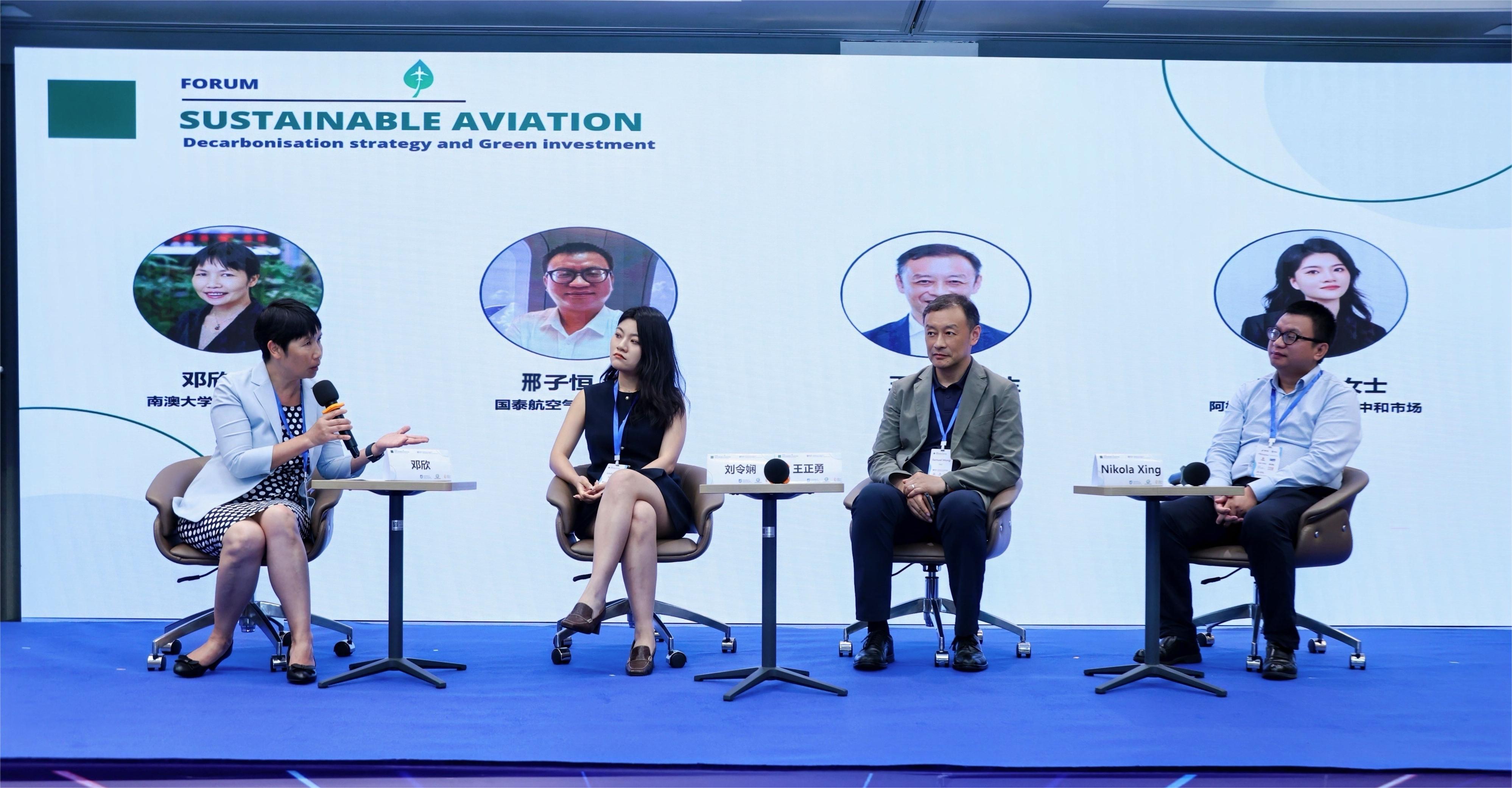
This Sustainable Aviation Forum highlighted cutting-edge topics such as the aviation industry’s low-carbon transition and the application of low-altitude technologies, fostering cross-disciplinary dialogue among a diverse group of experts. Going forward, the NUS Guangzhou Research Translation and Innovation Institute will continue to leverage its research strengths and foster collaboration across industries, working to build the Guangdong–Hong Kong–Macao Greater Bay Area into an innovation hub for smart transportation and the low-altitude economy. With scientific research as the driving force, NUS GRTII aims to empower the Greater Bay Area’s journey toward a greener, more innovative future.




